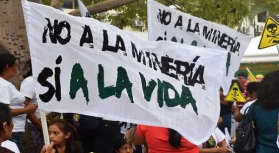President Saca Announces Deployment of Two Thousand Soldiers to Police Streets:
U.S. Ambassador’s Speech Used as Fodder for Drastic Move
On October 30, Salvadoran President Saca revealed his response to the increasing problem of violent crime in El Salvador by announcing that he will send two thousand more soldiers out into the streets, increasing the total of National Civilian Police (PNC) to 19,000. He also announced plans to train over two hundred more police in special “rapid reaction” squads, along with a package of legislation called the “anti-organized crime” laws that, like the so-called Anti-terrorism law, would allow the government further powers to crack down on crime. Of course, the glaring absence in Saca’s statements was any discussion about crime prevention.
Such further moves toward repression come with the clear endorsement of ARENA’s primary backers: the business sector and the U.S. government. On Monday, October 16 outgoing US Ambassador Hugh Barclay gave a speech calling for the government to act to immediately to end criminal violence, allegedly because of his concern for El Salvador’s economic future. According to Barclay, the most immediate solution to El Salvador’s dramatic crime problem is to put more police on the streets and more street criminals in jail (an estimated 12,000 according to the U.S. Embassy). Barclay said that the reason the government needed to combat crime was because it cut into profits and would deter foreign investment and thereby threaten the supposed benefits El Salvador should reap from CAFTA.
Barclay also used the speech to criticize the independence of the judicial sector and urged for “reform.” Although Barclay claimed that the intention of his speech was not to interfere in domestic Salvadoran politics, it is unclear what other intentions the outgoing Ambassador could have, especially since in a follow-up interview he again made clear that the Embassy hoped that an upcoming packet of anti-crime laws would be presented and approved at the Legislative Assembly.
Barclay’s declarations come at a time when the business sector has also been pressuring the government to address the crime situation. Instead of admitting the failure of its “Super Iron First” policy, ARENA is using the pressure to bolster repressive state institutions. Last week, there was a “reduced rights regime” introduced in prisons, as well as massive arbitrary movement of prisoners which forced members of rival gangs, who had been kept apart to avoid mass killings, into the same prisons. Also, in addition to the Anti-terrorism law, ARENA is preparing another packet of legal reforms that include changes to the judicial system – supposedly “expediting” trials – as well as giving the government more power in investigations and altering what is considered “acceptable” evidence in the courtroom.
The Salvadoran social movement continues to be very critical of such “tough on crime” policies since the general climate of fear and crime serves as a cover for targeted, political crimes while criminalizing poverty and social dissent. However, the social movement continues to organize and protest and together with the FMLN has prepared legal challenges to the Anti-terrorist law, as well as putting forward proposals for a broader solution to the crime problem (see previous CISPES update from October 10.)
Health Care Workers on Strike
Evidence that the social movement has not been intimidated is the current strike in the public sector hospitals. The Healthcare workers union STISSS has been progressively stepping up its 2-week strike to demand better wages for workers. The STISSS is demanding a $100 wage increase for all workers, and has shut down 46 medical clinics, including most of the large ISSS (public-sector) hospitals in San Salvador and other cities. According to the STISSS, the ISSS has the capacity to grant the wage increase if it cuts back unnecessary expenses for advertisements and non-existent units. Yesterday, the STISSS and the ISSS Administration carried out the first of four conciliation meetings, with no agreements reached.

 "I am a CISPES supporter because continuing to fight for social justice and a more people-centered country means continuing the dream and sacrifice of thousands of my fellow Salvadorans who died for that vision.” - Padre Carlos, New York City
"I am a CISPES supporter because continuing to fight for social justice and a more people-centered country means continuing the dream and sacrifice of thousands of my fellow Salvadorans who died for that vision.” - Padre Carlos, New York City

